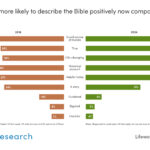
When it comes to morality, Americans don’t see much wrong with using birth control or getting a divorce, but few support extramarital affairs or human cloning.
The latest poll results from Gallup spell out what activities U.S. adults view as morally acceptable and which ones are seen as immoral.
Most Americans believe birth control (90 percent), divorce (75 percent), sex between an unmarried man and woman (68 percent), having a baby outside of marriage (67 percent), gay or lesbian relations (64 percent), gambling (63 percent), human embryonic stem cell research (63 percent), buying or wearing animal fur clothing (61 percent), the death penalty (56 percent), and doctor-assisted suicide (53 percent) are morally OK.
U.S. adults are more divided on abortion (49 percent morally acceptable v. 40 percent morally wrong) and medical testing on animals (47 percent morally acceptable v. 47 percent morally wrong).
Fewer Americans say sex between teenagers (41 percent), changing one’s gender (40 percent), pornography (35 percent), cloning animals (34 percent), polygamy (21 percent), suicide (21 percent), cloning humans (8 percent), and married men and women having an affair (8 percent) are morally OK choices.
Changing morality
The moral views of Americans are not static, however. Many have shifted over the more than 20 years Gallup has conducted this poll. Mostly, Americans have grown more permissive.
Only medical testing on animals has seen a sustained, significant decline in the percentage of adults who view it as morally acceptable. In 2001, 65 percent of Americans said it was morally OK. Now, just 47 percent support it.
The percentage of those who view the death penalty as morally acceptable has also dropped, but the dip has been smaller and less sustained over the past three decades — 63 percent in 2001 to 56 percent in 2025.
Support for changing one’s gender also fell this year, but it has only been asked in the past four years. In 2021, 46 percent believed it was morally acceptable. In 2025, 40 percent still agree. A 2016 Lifeway Research study of Americans found only 35 percent believed it was morally wrong for an individual to identify with a gender different than the sex they were born.
A 2021 Lifeway Research study of U.S. Protestant pastors found 72 percent say it’s morally wrong to identify with a gender different from your birth sex, and 77 percent say it’s morally wrong to change the gender you were born with through surgery or taking hormones.
On the other hand, Gallup found numerous activities have become more socially acceptable in America since 2001, including divorce (59 percent to 75 percent), sex between an unmarried man and woman (53 percent to 68 percent), gay or lesbian relations (40 percent to 64 percent), and suicide (13 percent to 21 percent).
Other activities were first asked about more recently, but they have also seen growth. Since 2002, support for both having a baby outside of marriage (45 percent in 2002 to 67 percent in 2025) and medical research using stem cells obtained from human embryos (52 percent in 2002 to 63 percent in 2005) has increased.
The percentage of Americans who believe polygamy is morally acceptable has tripled since 2003 – 7 percent to 21 percent. More people are also accepting of sex between teenagers (32 percent in 2013 to 41 percent in 2025).
Other activities have had more stable levels of approval since Gallup first asked. Since 2012, birth control has only wavered plus or minus two points from 90 percent. Buying and wearing clothing made from animal fur has stayed near 60 percent. Gambling has stayed mostly in the 60s. Support for the death penalty has been around 60 percent. Approval of doctor-assisted suicide has stayed around 50 percent. Those who approve of pornography have hovered somewhere around 30 percent to 40 percent. The percentage who support cloning animals has stayed mostly in the 30s, while cloning humans and married men and women having an affair have hovered around 10 percent.
Abortion has been more volatile than the other issues. Those who find it morally acceptable have stayed mostly in the 40s, but it has fluctuated from anywhere between 36 percent and 54 percent over the past two decades.
Generational differences
Younger adults, those 18-34, are often more permissive than their elders. Around 3 in 10 (31 percent) say polygamy is acceptable, compared to 10 percent of those 55 and older. Most (55 percent) are OK with changing one’s gender, while just 35 percent of older Americans support the practice.
Those who are under 35 are also more supportive of gay or lesbian relations (+19 percentage points), abortion (+16), sex between an unmarried man and woman (+13), sex between teenagers (+13), pornography (+12), buying or wearing animal fur clothing (+11), cloning animals (+9), cloning humans (+8), having a baby outside of marriage (+7), divorce (+6), suicide (+4), gambling (+3), doctor-assisted suicide (+2), and the death penalty (+2).
Meanwhile, they are less in favor than those 55 and older of human embryonic stem cell research (-2), birth control (-2), married men and women having an affair (-4), and medical testing on animals (-17).
This article originally appeared at research.lifeway.com.




















